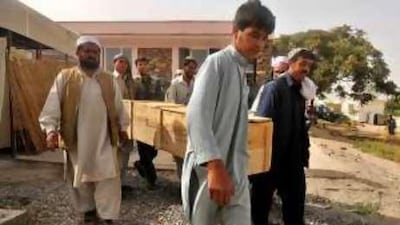LOGAR // If one province symbolises the violence sweeping through Afghanistan, it is Logar. Here, just a few kilometres from Kabul, people are taking up arms because they feel betrayed and abandoned by the government. "If everything gets worse what else can we do? We have to rob, turn to the insurgents or join the Taliban," said Baz Mohammad, a labourer. For years after the 2001 US-led invasion, Logar was regarded as relatively safe. Whenever officials raised security concerns, this area was hardly mentioned. The far south and east were all that counted in those days. Only in the spring and summer was the illusion of peace finally shattered. In May, masked men were reported to have entered local mosques and told people not to watch television. A few weeks later, a member of the upper house of parliament was kidnapped. Then, on Aug 13, three female foreign aid workers were murdered. Their Afghan driver was also killed. Speaking in Pul-e-Alam, the provincial capital, residents said the insurgents were now the only real alternative to an incompetent and corrupt government. Mr Mohammed, 27, is exactly the sort of man who is swelling their ranks. He struggles to find regular work and has nothing positive to say about the people who are meant to be running the country. He thinks his options are fast coming down to this: become a robber, join the police and make money from extortion or fight in the resistance. "It's true that a lot of young people are in danger of building their own insurgent groups or doing some other crimes. Let me tell you, if life gets worse that will be my future and I am sure it will soon happen across Logar," he said. "I would prefer the Taliban than the current government. OK, people say the Taliban used to cut off hands and do beheadings, but there was still security and you could go around safely at one o'clock in the morning. Tell me, can you do that now? Now before it gets dark you have to be at home or at least somewhere you can hide overnight or God knows what will happen to you." Logar borders Kabul and in half an hour it is possible to drive from the nation's capital into areas that are under the Taliban's de-facto control. Even Afghans are scared to travel this way, along one of the main routes to the country's south-east. Aziz Ahmad, another labourer, said he believes security will get worse and, like Mr Mohammed, he compares the current government unfavourably with the Taliban regime. "Even if someone is sick at home and it is night, we can't do anything. We have to wait until the morning. If we call a taxi driver to take the person to a hospital he will think we are thieves and never turn up," he said. Mr Ahmad, 30, claimed that the Taliban hold power in most of Logar's districts and that people are afraid of them because "they will ask us why our beards are short or why have we shaved". However, he admitted he was also considering joining the resistance, declaring that he was ready to "sacrifice my life" if it meant he could make money for his family. "If anyone offers me a job, whatever it involves, I won't say no," he said. Research by the International Council on Security and Development backs the idea that the militants are gaining strength. In a report published this month, it claimed the Taliban have a permanent presence in 72 per cent of Afghanistan, up from 54 per cent a year ago. "The road south to Logar is no longer safe for Afghan or international travel," it said, adding that the rebels were using bases in areas just outside Kabul to launch a growing number of attacks inside the capital. After the winter, this once-ignored province is likely to be a key battleground in a war most of the world thought was over. Among the people who will find themselves caught up in the struggle, few believe the outcome will be anything but bad. "There are lots of problems now and I don't see a good future for the young generations," said Abdul Haq, a rickshaw driver. "Only God knows of his affairs." * The National

Terror rules a once-safe haven
An unemployed labourer outlines his options: turn to crime, join the police and make money from extortion or fight with the insurgents.
Most popular today
